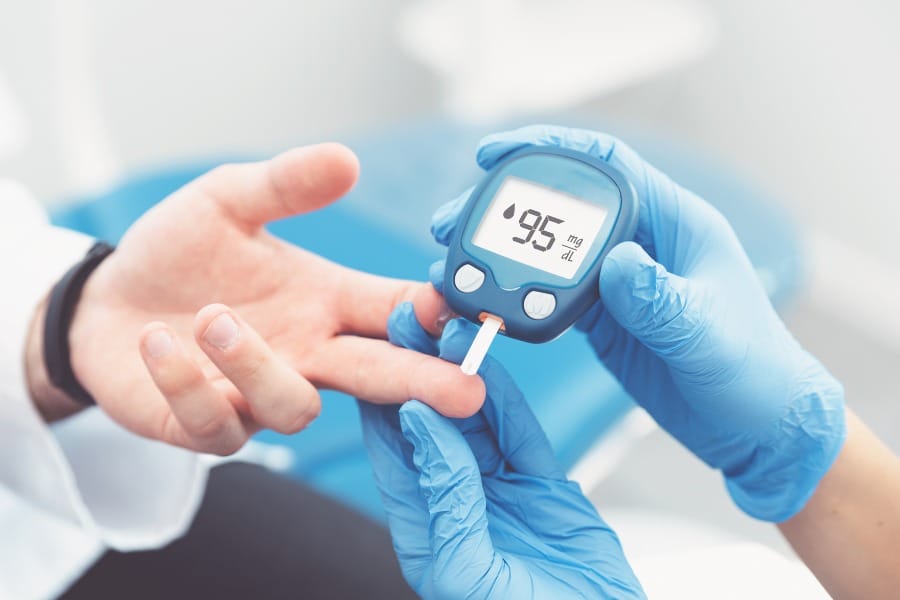Individuals who acquire diabetes typically manage the disease by following lifelong care plans.
Nurses help people with diabetes by providing treatment and educating patients about disease management. Nurses can hold specializations in care for type 2 diabetes, type 1 diabetes, prediabetes, and gestational diabetes.
New methods for managing diabetes are discovered frequently. Nurses who stay up-to-date on any new information surrounding diabetes are able to provide better management tools to people with diabetes.
There are five key ways that nurses help individuals manage their diabetes.
1. Learn about diabetes and how it affects the body, treatments, and self-care.
2. Nurses can explain to people diagnosed with diabetes how to best manage their disease on a specific case-by-case basis.
3. They can teach patients how to self-administer insulin injections, or a private duty nurse can administer shots for the patient.
4. Nurses can also provide education on how to check blood sugar levels and track diabetes through the use of a blood glucose monitor, and what to do when an insulin reaction occurs.
5. They can also educate individuals on recognizing symptoms of high and low blood glucose, and ultimately what they should do if symptoms arise.
Nurses can also guide people on how to make healthy lifestyle choices such as which foods to eat, how to quit smoking, and which exercise would be best for them.
Let’s dive a little more into understanding diabetes management.
Home Health Diabetes Management
IN THIS ARTICLE

Diabetes is a chronic disease that affects millions of people worldwide. It is characterized by high levels of glucose (sugar) in the blood, which can lead to a range of health problems.
Home health care is an important part of diabetes management, as it allows patients to receive the care they need in the comfort of their own homes.
One of the challenges of diabetes management in home health care is ensuring that patients receive the right care at the right time. This can be particularly difficult for patients who are elderly or have other health conditions, as they may require more intensive care and monitoring.
However, with the right support, patients can manage their diabetes effectively and avoid complications.
Home health care nurses can play an important role in diabetes management by providing education and support to patients and their families.
This may include teaching patients how to monitor their blood sugar levels, how to administer insulin injections, and how to make healthy lifestyle choices. Providers can also help patients to develop personalized care plans that take into account their unique needs and preferences.
It is important for home health care providers to work closely with other members of the patient’s healthcare team, including primary care physicians, endocrinologists, and diabetes educators.
This can help to ensure that patients receive the best possible care and that their diabetes is managed effectively.
Essential Components of Diabetes Home Care Management
Effective diabetes management involves a combination of lifestyle modifications and medical interventions. The following are the essential components of diabetes management:
Blood Glucose Monitoring
Blood glucose monitoring is a critical component of diabetes management. Individuals with diabetes should monitor their blood glucose levels regularly to ensure that they are within the target range.
This can be done using a blood glucose meter, continuous glucose monitoring system, or other devices. Regular monitoring helps individuals with diabetes to identify patterns and make adjustments to their treatment plan as necessary.
Medication Adherence
Medication adherence is crucial for individuals with diabetes to achieve and maintain optimal blood glucose control.
This involves taking medications as prescribed by the healthcare provider and following the recommended dosages and administration schedules. Non-adherence to medication can lead to complications and poor health outcomes.
Nutritional Planning
Nutritional planning is an essential component of diabetes management. Individuals with diabetes should follow a healthy eating plan that is tailored to their individual needs and preferences.
This involves consuming a balanced diet that includes a variety of foods from all food groups in appropriate portions. A registered dietitian can help individuals with diabetes to develop a personalized meal plan.
Physical Activity Guidelines
Physical activity is crucial for individuals with diabetes to maintain good health and blood glucose control. Regular exercise can help to improve insulin sensitivity, reduce blood glucose levels, and lower the risk of complications.
Individuals with diabetes should aim to engage in moderate-intensity aerobic exercise for at least 150 minutes per week, in addition to resistance training and flexibility exercises. It is important to consult with a healthcare provider before starting an exercise program.
Discover the underlying cause of diabetes and the disease process

Diabetes occurs when the pancreas stops producing insulin or when the body becomes insulin-resistant. The exact reason is unknown, yet there are environmental factors that can contribute to the cause of the disease. Risk factors include a lack of exercise, obesity, and genetics. If there is a family history of any parents or siblings with the disease, the risk for diabetes will increase.
Prevent diabetic complications
Complications can be short-term and/or long-term. Acute complications consist of diabetic ketoacidosis (DKA) and hyperglycemic hyperosmolar non-ketotic syndrome (HHNS).
There are some basic prevention methods. Diabetics should take medications as prescribed by a doctor and monitor blood sugar levels.
They should enjoy a balanced diet and avoid skipping meals. Exercise is very important in diabetes management, too.
Long-term complications regarding the cardiovascular system, eyes, nerves, or kidneys may begin to appear after a couple of years.
Some methods used to prevent these chronic complications include aggressive control of blood sugar, treatment of other issues like high cholesterol, and use of aspirin. ‘
Get early screening done for eye problems like glaucoma and retinopathy. It is also important to take control of blood pressure levels and have yearly blood tests.
Correct and reverse abnormal metabolic functions.
There are multiple ways to correct and reverse abnormalities in metabolic functions.
These methods include diet modification, proper hydration, and use of dietary supplements. Use of these methods will improve metabolic efficiency and even strengthen cellular biochemistry.
Repair the balance of electrolytes, acid-base balance, and fluids in the body.
Electrolytes are minerals-such as calcium-that help move nutrients into cells and remove any unwanted waste.
Electrolytes can be administered through the use of IV fluids, IV medications, oral medications, supplements, and hemodialysis.
The ideal pH level is around 7.3. This level can be acquired through eating and drinking less acidic drinks or foods. The key is to eat enough fruits and vegetables and drink plenty of water to return to an alkaline state.
Implementing a Diabetes Home Care Plan

Managing diabetes can be a challenging task, especially when it comes to home health care.
However, with the right care plan and coordination, patients with diabetes can maintain their health and prevent complications. Here are some key elements to consider when implementing a diabetes care plan:
Patient Education
One of the most critical components of diabetes care is patient education. Patients should have a clear understanding of their condition, including how to manage their blood sugar levels, take medication, and adopt a healthy lifestyle. Patients should also be aware of the signs and symptoms of complications and know when to seek medical attention.
To ensure that patients receive the education they need, healthcare providers should provide clear and concise information, tailored to the patient’s individual needs. This may include written materials, videos, or one-on-one counseling.
Caregiver Coordination
For patients who require assistance with daily tasks, such as administering medication or monitoring blood sugar levels, caregiver coordination is essential. Caregivers should be trained on the patient’s care plan and be able to communicate effectively with healthcare providers.
To facilitate coordination, healthcare providers may use technology such as mobile apps or remote monitoring devices. These tools can help caregivers track the patient’s progress and communicate any concerns with the healthcare team.
Regular Health Assessments
Regular health assessments are critical for patients with diabetes. These assessments can help identify potential complications early, allowing for prompt treatment and prevention of further complications.
Health assessments may include monitoring blood sugar levels, blood pressure, and cholesterol levels. Patients should also receive regular eye exams, foot exams, and dental exams.
Get Exceptional Diabetes Home Care Management
A nurse can help diabetes patients on many levels. At NurseRegistry, we have private duty nurses specialized in diabetes management. Our nurses can provide home visits to administer insulin injections, perform wellness checks, manage medications, and more.
Click below to get exceptional home nursing care for diabetes today.
Frequently Asked Questions about Home Health Diabetes Management
What dietary adjustments are recommended for effective diabetes management at home?
Maintaining a balanced and healthy diet is crucial for effective diabetes management at home. Patients with diabetes should avoid consuming sugary and processed foods, and instead focus on consuming whole foods that are rich in fiber, vitamins, and minerals. Home health care professionals can also provide guidance on portion control and meal planning to ensure patients are eating a well-balanced diet.
What services can a diabetes nurse provide during home visits?
A diabetes nurse can provide a variety of services during home visits, including monitoring blood sugar levels, administering insulin injections, and providing education on diabetes management. They can also assist with medication management and help patients develop a personalized diabetes management plan.
How can home health care professionals educate patients about diabetes management?
Home health care professionals can educate patients about diabetes management by providing information on healthy eating habits, monitoring blood sugar levels, administering insulin injections, and performing other necessary tasks. They can also help patients develop a personalized diabetes management plan and provide guidance on how to manage diabetes-related complications.
What are the best practices for taking care of a diabetic patient at home?
The best practices for taking care of a diabetic patient at home include monitoring blood sugar levels regularly, ensuring that the patient is eating a well-balanced diet, administering insulin injections as needed, and providing education on diabetes management. Home health care professionals should also be aware of the signs and symptoms of diabetes-related complications and be prepared to take appropriate action if necessary.
What responsibilities does a home health aide have in caring for a diabetic patient?
A home health aide has several responsibilities in caring for a diabetic patient, including monitoring blood sugar levels, administering insulin injections, providing assistance with daily activities, and ensuring that the patient is following a healthy diet. They may also be responsible for monitoring and reporting any changes in the patient’s condition to their healthcare provider.
Are there any benefits or free services available for diabetics through home health programs?
Yes, there are benefits and free services available for diabetics through home health programs. These programs may provide education on diabetes management, assistance with medication management, and support for patients and their families. Some programs may also offer free or low-cost medical supplies and equipment, such as glucose monitors and insulin pumps.
Resources
Information for professionals can be found at the Centers for Disease Control and Prevention.
The American Diabetes Association has resources for diabetes professionals in their research and practice page.
Plenty of resources and information are located at the International Diabetes Federation.






